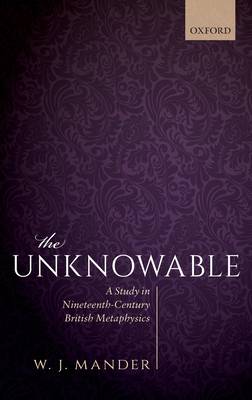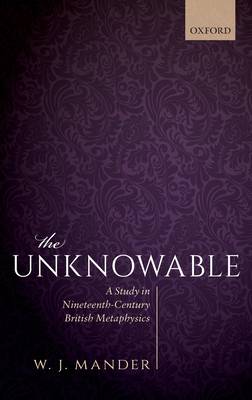
- Afhalen na 1 uur in een winkel met voorraad
- Gratis thuislevering in België vanaf € 30
- Ruim aanbod met 7 miljoen producten
- Afhalen na 1 uur in een winkel met voorraad
- Gratis thuislevering in België vanaf € 30
- Ruim aanbod met 7 miljoen producten
Zoeken
€ 169,45
+ 338 punten
Omschrijving
W. J. Mander presents a history of metaphysics in nineteenth-century Britain. The story focuses on the elaboration of, and differing reactions to, the concept of the unknowable or unconditioned, first developed by Sir William Hamilton in the 1829. The idea of an ultimate but unknowable way that things really are in themselves may be seen as supplying a narrative arc that runs right through the metaphysical systems of the period in question. These thought schemes may be divided into three broad groups which were roughly consecutive in their emergence but also overlapping as they continued to develop. In the first instance there were the doctrines of the agnostics who developed further Hamilton's basic idea that fundamental reality lies for the great part beyond our cognitive reach. These philosophies were followed immediately by those of the empiricists and, in the last third of the century, the idealists: both of these schools of thought--albeit in profoundly different ways--reacted against the epistemic pessimism of the agnostics. Mander offers close textual readings of the main contributions to First Philosophy made by the key philosophers of the period (such as Hamilton, Mansel, Spencer, Mill, and Bradley) as well as some less well known figures (such as Bain, Clifford, Shadworth Hodgson, Ferrier, and John Grote). By presenting, interpreting, criticising, and connecting together their various contrasting ideas, this book explains how the three traditions developed and interacted with one another to comprise the history of metaphysics in Victorian Britain.
Specificaties
Betrokkenen
- Auteur(s):
- Uitgeverij:
Inhoud
- Aantal bladzijden:
- 328
- Taal:
- Engels
Eigenschappen
- Productcode (EAN):
- 9780198809531
- Verschijningsdatum:
- 19/07/2020
- Uitvoering:
- Hardcover
- Formaat:
- Genaaid
- Afmetingen:
- 163 mm x 236 mm
- Gewicht:
- 680 g

Alleen bij Standaard Boekhandel
+ 338 punten op je klantenkaart van Standaard Boekhandel
Beoordelingen
We publiceren alleen reviews die voldoen aan de voorwaarden voor reviews. Bekijk onze voorwaarden voor reviews.











